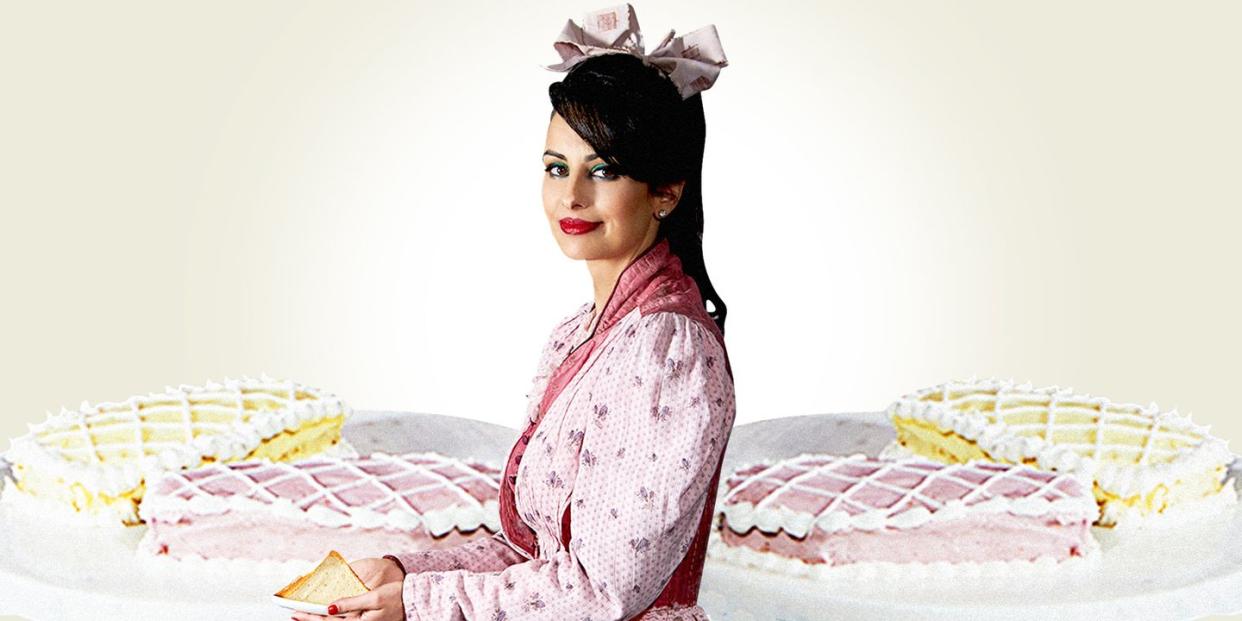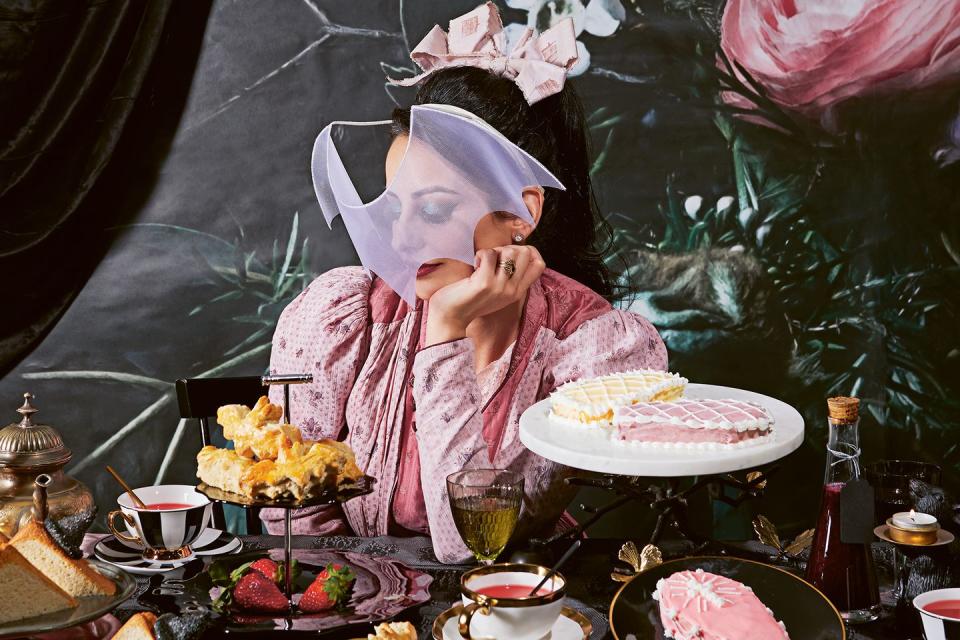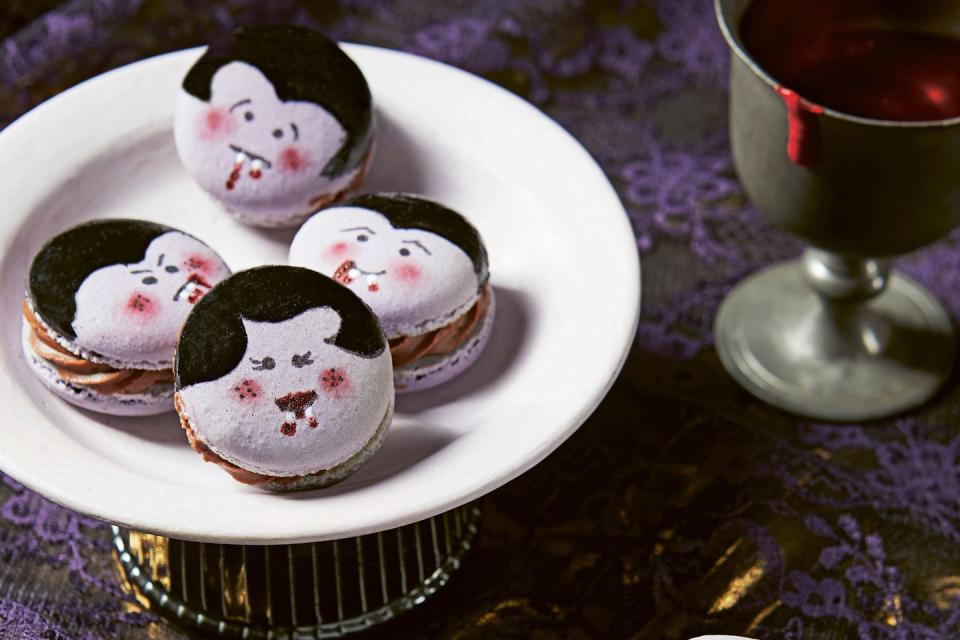Helena Garcia of 'The Great British Bake Off' Wrote a Cookbook Full of Witchery...and Fondant

Helena Garcia is not a goth. "I think I see myself more as witchy than gothic," she says with a smirk. Since her stint on last season of The Great British Bake Off, where her premature exit had the U.K. (and the world at large) demanding more spooky-adjacent culinary content, people have been making the mistake of conflating the two. Is the notoriously campy baker a little dark? Sinister? Dead? Yes to all the above. But colorful hat boxes are stacked all around her in her Yorkshire home, framing the window of her Zoom call. She's wearing a bright yellow sweater adorned with bats. There is a sewing station nestled against the wall, which is covered in pale pink wallpaper. Of course Garcia is not goth.
Garcia is a self-proclaimed witch who dabbles in light frights, though in the more classical sense of what a "witch" is: a strong woman who knows her way around some of the earth's most mystical and medicinally pungent natural ingredients. That aesthetic has undeniably made its way into Garcia's inaugural cookbook The Wicked Baker, which debuted last month. The collection is a celebration of the witchy tenets she holds near infused with the Pagan holiday that we all think of: the hats, the cauldrons, the skeletons. And beneath the fondant and decoration is a guide to some of the staples she made on Bake Off months before. If you've never dared a croquembouche or a simple shortbread recipe, Garcia can guide you through the daunting process, cobwebs in tow. The point of these recipes is to prove that anyone is capable of culinary excellence.
Helena’s dead? Of corpse she is. #GBBO pic.twitter.com/7yWn2yhIsk
— British Bake Off (@BritishBakeOff) September 24, 2019
Last year, Garcia and I chatted after her exit from The Great British Bake Off—perhaps a bit too soon after, as she was still beholden to the show's nondisclosure agreement. But with The Wicked Baker, Garcia hopped on Zoom to talk with me again, this time about her post-Bake Off year, releasing a book, and obviously, witches.
This interview has been edited and condensed for clarity.
ESQ: It is so nice to talk to you again. It feels like a really good time for The Wicked Baker, because trick or treating is going to be curbed, and if you're not able to go out, why not make the treats inside?
HG: Make Halloween what you want! At the end of the day, I prefer it cozy at home. I think I'm gonna have a little private dinner party with some of the [Bake Off] bakers.
ESQ: We spoke last year when you exited the show, and I asked you what it was like to be dead. You said it was liberating.
HG: Yeah. You don't care about the consequences of anything. I live my life dead.
ESQ: I was going to ask how death is treating you, but it seems like it's great.
HG: It’s fabulous. You just get away with everything.

ESQ: One of my favorite things you said, in response to whether you were going to start commissioning cakes, was, "If I had to make a cake in the shape of Barbie"—and then you paused for a second—"I'd die."
HG: I didn't know I said that! I stand by it. I enjoy baking, not only because I like to eat it, but as a creative expression, so if I had to do it for someone else's taste, it [would] kill it for me completely.
ESQ: That's why I was so excited to see this book, because it is very much a carry-over from what you did on the show. How did you narrow the recipes down?
HG: I almost said no. My agent almost killed me, because they offered me the deal at the beginning of December and I had to have 50 recipes written by end of January, so I panicked. Then I spoke to previous cook authors and they said if you just do it full-time—every day get your head down and get the recipes written and test them later on, just have the manuscript written—you can totally do it.
I wrote the recipes first, then I tested them, then I convinced the editor to bring the photographer—it's all women! What is it with publishing? It's 100 percent women. It's like, I haven't met one guy yet in the publishing world.
ESQ: That's so cool.
HG: Oh, I loved it. It was like a proper powerhouse. We did have all the photographing in our house. It was easy to say: That will look really good if we had a cauldron. No problem, I've got like 35 cauldrons.
ESQ: I literally have a question written down that just says, “How many of these props does Helena actually own?”
HG: A lot. Not all of them. We had an amazing girl that brought dried flowers, fabrics. The other half of the photographing was at a studio in London, and Noel [Fielding, Bake Off host] asked me, “Can I be in the book?” I was like, "Yeah, do me a massive favor, that'd be great." That was the week of [the COVID-19] lockdown, and literally we finished this and all book shoots were cancelled right after, so I got very lucky.

ESQ: Speaking of this year, what is being goth like in 2020? Because I think we've all leaned a bit more into the darkness this year.
HG: Well, I think I see myself more as witchy than gothic. I don't dress in black. When I think of goth, I think of the '80s goth... all with white faces and black hair. I never identified as that. But what I mean too is the history and the witches in art and popular culture. Witches, at the end of the day, we're independent women that have knowledge of magical plants, medicinal plants. And forage—I love to forage. We're in tune with nature. And obviously the connection with Halloween, it is a Celtic Pagan holiday, and it's based on the harvest and vampires feasting and all of that. I think Christians just ruined it for all of us. Those celebrations were so much more fun.
ESQ: Speaking of foraging and the medicinal side of being a witch, my favorite recipe in the book is the Midnight Flight cocktail.
HG: The one with the violets! Oh, fantastic! You get a natural purple color. I think that's fabulous. I brought my girlfriends over one night and we made lots of cocktails. Of course, we got absolutely trashed, but that's part of the research process.
ESQ: What was it like getting the offer for the cookbook?
HG: In 2017, I wrote the book called Introduction to Witchery, and it was very much an introduction to plants that you can forage, what they're good for, magical mushrooms—like certain mushrooms that are able to hold a coal and burn for seven days, untouched. To me that's magical and that's real science. They were key for our ancestors to be able to develop. [The book] is very short but at the same time it has a whole crafts section about how to make your own clothes, so, everything that I love. It was fully illustrated by my friend who is fantastic, and I had a book deal for that.
Then, five days later, a different publisher who had my manuscript got an in-house editor to write a similar book, so the deal that I had on the table got withdrawn. I thought my take on it was just so individual that I said, “I don't care, I'm not doing this as a business. I'm gonna self-publish it anyway,” and it was a hit. I sold out. This is nothing to do with the Bake Off. When I came out of the Bake Off I got an agent straightaway, because I was approached by What We Do in the Shadows to do a cameo.
ESQ: Did you do it?
HG: Yeah! I did it on Season Two. It was amazing. I went to Toronto to film it. I can't believe they flew me all the way there to deliver two lines, but I guess that's how that show is so hilarious. They're willing to do that. [But] I needed an agent, so I called a woman, and she took me in. So with my previous book, she thought, "Well, you only printed 500 copies, let's try to sell the rights to that book to a publisher," and what happened was one publisher came back and said, “No, we want her to do an all-baking book." And that's how it happened.
ESQ: I know that you're still riding the high of the cookbook, but do you have any ideas on what could come next?
HG: I think the publishers would probably want a second book. I wonder if I'll be able to convince them to go back into the witchery aspects. I can add spooky types of bakes to anything, but I want a little bit of history—a little bit of information that people can choose to read or go straight to the baking. But it's always about doing what's commercial and your passions, so we'll see.
ESQ: It's interesting because at one point in history, witches were harangued and killed, and now it's almost like a novelty in a way.
HG: The ones that I wrote about concentrated on European witches. I mean, I did go to Salem, and I absolutely loved it. Forget the witch side of it, I loved the town. It's the perfect size, it's on the seaside. But the witches in the U.K. were far more witch-like. They were foragers. My favorite one is from Yorkshire, the area that I live in, and she was born in a cave on a stormy night and actually quite ugly… like a crooked nose and stuff. She made these crazy predictions about the future and got all this stuff right, and she used to forage the lands for mushrooms and stuff.
People used to come to her for advice. Those in history are what nowadays we will refer to as witches: Women that also perform midwife duties, because midwives didn't exist, and if a young girl got pregnant, she would have been ruined for life, so they would perform abortions. But I think what happened in Salem was just an absolute hysteria, and people started accusing other people of witchcraft out of pure jealousy.

ESQ: I'm enjoying this current season of Great British Bake Off, but the contestants don’t seem as close as your season.
HG: Even though they are actually living together, they don't seem to be all over each other like we were all over each other. We still are now.
ESQ: It would have been insane if you guys had all lived together. It would have been unhealthy, that's how close you all seemed.
HG: Someone like Michael [Chakraverty] who's so anxious, he would've drove me absolutely crazy. He needs constant reassurance, so to have that 24/7, it would have been a nightmare.
ESQ: Clearly the recipes in The Wicked Baker are first and foremost about baking, but the book takes it to this next level where you can elevate bakes into a production.
HG: I think I said that in the introduction. For me, I've always loved cooking. I cooked as a teenager for my family because I wanted to, not because they needed it. For me, baking is cooking with added creative possibilities. So it's like, "Great, I get to make food, which I love doing, but on top of it, I get to sculpt, decorate, and all the things that I love in life regardless."
ESQ: When I look at the photos, I'm like, that's absolutely gorgeous, I cannot do that.
HG: It's funny that you say that, because Michael [Chakraverty] got the book early and he was like, “Oh my god, I can't do any of this.” And I was like, "Michael, you've been on the Bake Off, of course you can." Then he starts reading through it. He read it twice, cover to cover. He's like, “Oh no, I think I can.” It looks impressive, and that's part of the key with Bake Off. Make it accessible but make it look impressive. I think that's what David [Atherton], who won, was best at. Simplify it, but whatever you do, do it perfect.
You Might Also Like


